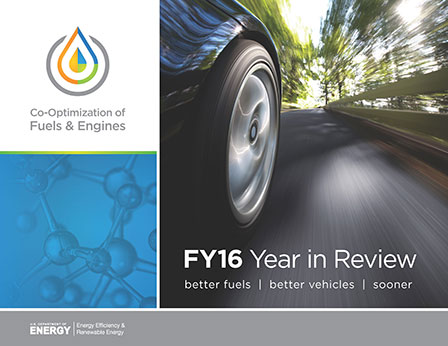Co-Optima Targets Maximum Transportation Sector Efficiency, Energy Independence and Industry Growth

The National Renewable Energy Laboratory (NREL) released a new report that spotlights key accomplishments the first year of the U.S. Department of Energy Co-Optimization of Fuels & Engines (Co-Optima) initiative.
The NREL-led initiative is the first to fully integrate high-performance fuels and combustion research and development (R&D) to put better engines and fuels on roads sooner. It is projected that this integrated approach could lead to an annual $40 billion in fuel cost savings, increase energy independence with domestic feedstocks supplying more than 30 billion gallons of biofuels, drive market demand for biofuels and new engine technologies, and create hundreds of thousands of new jobs. NREL is collaborating with eight other national labs on the landmark project.
"We know that internal combustion engines and petroleum-based fuels will continue to play important roles in our transportation mix for the next several decades," says Co-Optima Project Leader and NREL Vehicle Technologies Program Manager John Farrell. "Bio-based blendstocks' unique chemical and physical properties can help push engines to much higher levels of efficiency and performance, providing significant advantages to American consumers and businesses."
Co-Optima's key accomplishments from the first year include:
- Identifying more than 40 candidate blendstocks that can be produced from biomass and blended with petroleum to increase the efficiency of downsized turbocharged spark ignition (SI) engines
- Conducting state-of-the-art experiments to identify the effects of individual fuel properties on SI engine efficiency
- Establishing a publicly-accessible database of fuel property information for approximately 400 bio- and petroleum-derived blendstocks
- Developing advanced modeling tools and conducting high-fidelity simulations to complement engine experiments
- Conducting lifecycle and techno-economic analyses on 20 representative bio-blendstocks to assess their performance across 15 scalability, affordability, and sustainability metrics.
Although vehicles have become more fuel efficient, transportation still accounts for 70% of overall U.S. consumption of petroleum, a quarter of which is imported. Co-Optima teams are addressing the need for increased efficiency through two concurrent phases of R&D that explore the improvement of near-term spark-ignition engine efficiency as well as advanced compression ignition and low-temperature combustion strategies needed for longer-term, higher-impact solutions.
At the same time, Co-Optima researchers are evaluating a much more comprehensive list of possible biofuels than those currently approved for use, with the goal of capitalizing on unique properties to optimize performance and economic benefits. The team is focused exclusively on candidates such as forestry and agricultural waste that can be produced from the projected future billion-ton wealth of renewable U.S. biomass sources and do not compete for land needed to raise food.
Sponsored by DOE's Vehicle Technologies Office and Bioenergy Technologies Office, Co-Optima partners include NREL, ORNL, and PNNL, as well as Argonne, Idaho, Lawrence Berkeley, Lawrence Livermore, Los Alamos, and Sandia National Laboratories.
Learn more about NREL's involvement in Co-Optima and other transportation research.
Last Updated Jan. 22, 2026
